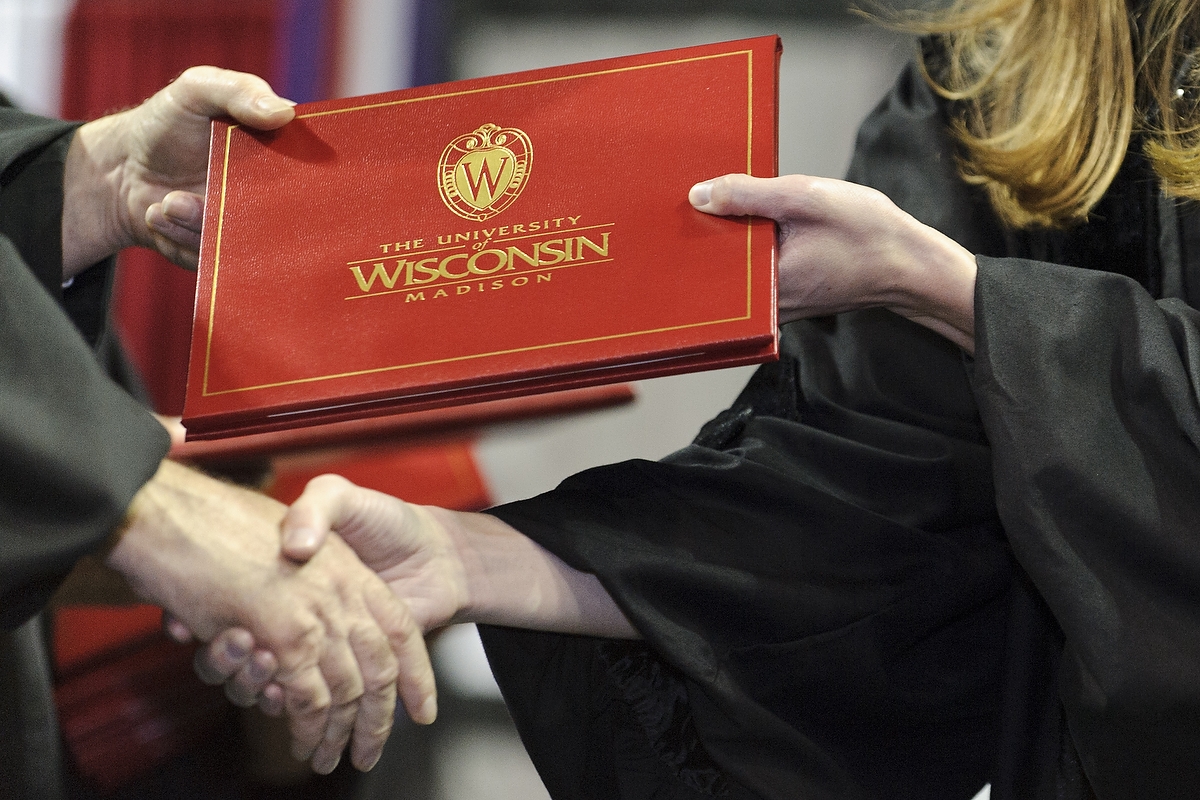Surveys provide valuable data for graduate programs and prospective students

A graduate student receives a doctoral degree during UW–Madison Commencement at the Kohl Center in 2013. Photo: Jeff Miller
The University of Wisconsin–Madison’s graduate degree programs result in a net brain gain for the state — and jobs for about three in four Ph.D. candidates even before they complete their doctoral program, according to data collected by the UW–Madison Graduate School.
Over the past three years, the Graduate School’s office of Academic Planning and Assessment has surveyed master’s and doctoral degree recipients at the time of their graduation. The surveys were developed as part of a national data exchange with the Association of American Universities.
Seventy-two percent of UW–Madison doctoral candidates surveyed who hoped to find a job had a signed contract or a definite commitment for employment waiting for them upon completion of their degree — with 89 percent of those finding employment in their specific doctoral field.
For prospective and current students, post-graduation employment data shed valuable light on both the possible career paths available to them and the type of skills necessary to be successful in a chosen career. Graduate degree holders from the university are finding careers in education, government and private for-profit and nonprofit organizations.
Many UW–Madison students graduating with a doctorate come from Wisconsin and stay in the state after they complete their degrees. Of doctoral degree recipients, 17 percent were residents when they entered graduate school. 24 percent of Ph.D. alumni reported working in the state after earning their degrees.
Eighty-one percent of doctoral students rated their programs as “very good” or “excellent,” and survey results provide important insights into the quality of the academic experience on campus.
72 percent of UW–Madison doctoral candidates surveyed who hoped to find a job had a signed contract or a definite commitment for employment waiting for them upon completion of their degree.
“The results from the Doctoral Exit Survey, where educational satisfaction of graduates between 2012 and 2015 was compiled, indicated a high aggregate satisfaction in financial, information technology and research resources,” says Graduate School Dean William Karpus. “Additionally, our graduates indicated overall satisfaction with faculty mentoring, which is an indication of the high quality of the faculty at UW–Madison.”
Initial survey information is being made available to the public by the end of the fall semester and will also be used by graduate programs for self-evaluation.
“Access to information from their graduates will help graduate programs identify areas of strength and areas for improvement,” says Mary-Butler Ravneberg, the policy and planning analyst in the Graduate School’s office of Academic Planning and Assessment.
“The survey did indicate that we need to work on advising students more comprehensively about the breadth of career options,” Karpus says. “To that end, a number of initiatives are underway and being led by the Graduate School.”
If you have questions about the data and its impact on campus, contact Marty Gustafson, Graduate School office of Academic Planning and Assessment.
See the survey questions and data for the entire Graduate School
Tags: alumni, Graduate School, research




